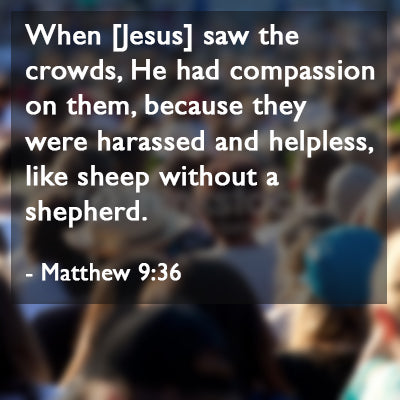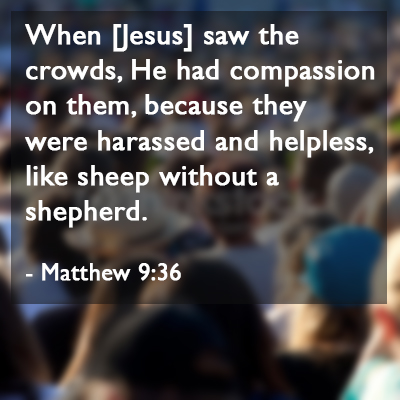When He saw the crowds… – Matthew 9:36
If you want to get the attention of a roomful of teenagers, turn something wild loose. A little touch of chaos in the atmosphere periodically is an asset to any youth group.
Years ago when I was a youth pastor, I turned something loose as I got ready to tell the parable of the lost sheep (Luke 15:1-7). After a little searching, I found a modern-day shepherdess, a middle-aged woman, on the outskirts of our town, Rochester, New York. My wife and I went out to visit the shepherdess on her farm, and she agreed to come to the city and talk about what she had come to understand about the nature of sheep and how she tended them.
Just as I started to speak at the youth meeting that Wednesday night, the back door swung open and in ran a little lamb. That cute animal cut back and forth through the rows and legs of students. The place went wild with excitement. Inserting a live animal into the environment brought a livelier view to the Bible story I wanted to tell.
Jesus has a POV altogether different from ours.
POV is a literary and theatrical term used to describe “point of view.” POV is the viewpoint, angle, or perspective through which someone observes settings, situations, or people. But what was Jesus’ POV? The gospel of Matthew tells us the way he viewed the Crowds:
When [Jesus][Jesus] was just as intentional about reaching the crowds as He was individuals, but with distinctly different approaches… Jesus saw interaction with the crowds as a way of planting seeds in people’s hearts (Luke 8:4-18), a way of arousing spiritual interest, and a way of finding disciples to be taught. He was looking for those who were hungry for more, so He could invest His time wisely with them.
Looking at the Crowds, Jesus saw that the challenges people faced varied. Even now, he sees that you and I, and also the Crowds among which we find ourselves, struggle with the fact that we have
- an enemy (thus, we’re “harassed”);
- a hopelessness (thus, we’re “helpless”); and
- a lonely lostness (thus, we’re “like sheep without a shepherd”).
I hope you know just how much Jesus loves you. One way to find out is to know just how he sees you.
Characteristics of Sheep
Sheep generally run in flocks, in groups. This is where Christ often finds us first, among the Crowds. Remember, the Crowds represent those who follow Jesus to the places of watching and listening.The Crowds often surrounded Jesus. This experience for Jesus never smacked of a celebrity with his fans; rather he was a Shepherd with his sheep.
The shepherdess who visited our youth group gave us insights into sheep and their behavior. Hearing these was an eye-opener for me. Let’s just say, I could identify. Christ also sees these tendencies within you and me.
Sheep Have No Real Sense of Direction
We know from the Gospels that Christ came to earth to seek and to save the lost (Luke 19:10).
Sheep have a propensity for getting lost.
Knowing Christ and growing closer to Him begins with a sense of need. For the earliest followers of Jesus who heard about Him and made their way into the Crowds, their focal point at this place was their questions. But because of the vast multitudes, they did not have the opportunity to ask Jesus. We can only imagine the questions they must have asked themselves:
- Is Jesus really someone come from God?
- Can he really help me with my struggle?
- Does he understand how I feel?
- Is there some way I can get closer to him in order to gain his help?
Sheep Are Quite Helpless Against Predators
Christ told us, “The thief [Satan] comes only to steal and kill and destroy” (John 10:10). When you sense an enemy trying to diminish or harm you, Jesus sees your need and can rescue and protect you.
Sheep Left Alone Will Actually Eat Themselves into a Lost Place
Even in the Old Testament, Isaiah said, “We all, like sheep, have gone astray” (Isaiah 53:6).
Our default mode tends to find us wandering to places that hurt more than help us.
Sheep Are Weak
And often, so are we. Yet the apostle Paul took time in 2 Corinthians to talk about our weaknesses and how even they can make a place for Christ’s strength to be revealed (check out 2 Corinthians 12 for strong points on weakness).
Sheep Get Dirty Easily
Everything seems to stick to their wool, and sheep do not clean or groom themselves. Our lives and souls can get quickly and easily soiled in today’s world. We often struggle to find a lasting sense of holiness and wholeness on our own. We really do need a shepherd to clean us up.
Sheep Are Gregarious, Social Creatures That Do Better in Numbers
We all do better in community than we do alone. We are created for community. We are formed for friendship. Isolation and loneliness tend to wither our souls; community helps grow them.
Sheep Require More Care than Any Other Livestock
They are time-intensive animals to raise, and they require much from their caretakers. So do we. Just ask your pastor (shepherd) or your parent.
Sheep Are Timid and Easily Panicked
They stampede easily and are prey to mob reactions. Is it any wonder Jesus so often said to His followers, “Fear not”?
Pathos
The Bible’s statement that Jesus was “moved with compassion” is a deep expression of soul, one full of pathos, passion, and heart. According to The Message, “His heart broke.”
Since we are “harassed” by an enemy, Jesus alone can overcome Satan’s power in our lives.
Since we are “helpless,” Christ alone is our “ever-present help in trouble” (Psalm 46:1).
Since we are “like sheep without a shepherd,” Jesus alone is the Shepherd who “lays down his life for the sheep” (John 10:11).
Jesus sees the challenges, struggles, hurts, and pains of our sheep-ness and sheepishness.
One reason God sent His Son to earth was to make sure we would know just how He, God the Father, feels about us and just how He sees us. He is moved by the needs of your life. He sees you that way. No matter what challenge you face, you are not alone. When it comes to you and me, Jesus has a unique POV. He sees Crowds in a unique way, like “sheep without a shepherd.” And isn’t that the only way a Good Shepherd ever would?
Remember… in the Crowds, we discover how much we need a Shepherd.
Excerpted with permission from The One Jesus Loves by Robert Crosby, copyright Thomas Nelson, 2014.
* * *
Your Turn
Isn’t it a relief that Jesus’ response to our sheep-ness is compassion? Isn’t it encouraging that His response to our need for a Shepherd is to never leave us alone? Come join the conversation on our blog! We would love to hear your comments about our Good Shepherd. ~ Devotionals Daily


